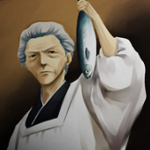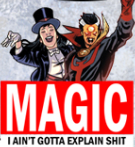|
sebmojo posted:Post a link, posh. I'd like to read it. Yeah post a link in here and I'll look over a couple in return.
|
|
|
|

|
| # ? May 14, 2024 15:44 |
|
Scaramouche posted:- Advice on avoiding passive voice problems. Note my use of articles, adverbs, and commas in this post. I have a real problem with passive voice. Also note all the parenthetics. Silvyfox posted:http://www.hemingwayapp.com/
|
|
|
|
Kgummy posted:Well, if you're looking for something that will point out that kind of thing, there's the Hemingway App thing. I'll just quote the post, since it gives a good enough description of it. That and I haven't messed with it enough yet myself. That is cool as hell. I'm going to use the poo poo out of this. I'll also echo excitement about a new nano topic. The manus-cramp I'm trying to wrap up is from nano 13-14. I'm excited to read others' work!
|
|
|
|
The Hemingwayapp site is a good tool, but just keep in mind that it's giving you advice based on simple if-then rules. Maybe that adverb is really useful or it's important to the tone to have a run-on sentence. What it's really good at though is letting you make those informed choices, so if you choose to use an adverb, it's an adverb you've thought about.
|
|
|
|
Scaramouche posted:Hay Guyz. THUNDERDOME We will beat that passive voice out of you. I went from scientific writing (lots of passive voice!) to thunderdome and it has helped immensely. And with the quick turn around, you don't sit there doing the same things wrong over and over (unless you're a special someone). Join us!
|
|
|
|
also you will be judged mercilessly
|
|
|
|
The Hemingway app is kinda poo poo though, because it can't tell the difference between passive voice and "Tom was happy."
|
|
|
|
SurreptitiousMuffin posted:The Hemingway app is kinda poo poo though, because it can't tell the difference between passive voice and "Tom was happy." and you can read and go "well i need that". its good at identifying fat, you just need to know what to trim
|
|
|
|
SurreptitiousMuffin posted:The Hemingway app is kinda poo poo though, because it can't tell the difference between passive voice and "Tom was happy." It also can't identify adverbs properly at all. And it rates Hemingway's writing as "Bad."
|
|
|
|
As far as I can tell it treats all words ending in -ly as adverbs, and all sentences that go '(noun) was (x)' as passive.
|
|
|
|
I like slickwrite WAY more than Hemingway. http://www.slickwrite.com/ In particular - check out the FLOW tab, STATS. If you're trying to get a rhythm to your writing - building up suspense, etc, this is a great tool; shorter sentences leading up to the big event, etc.
|
|
|
|
magnificent7 posted:I like slickwrite WAY more than Hemingway. Yo goddamn this is an incredible tool. I've barely played around with it for 5 minutes an I've already found 10 new ways to feel inadequate about my prose.
|
|
|
|
Hungry posted:Yo goddamn this is an incredible tool. I've barely played around with it
|
|
|
|
" have not showered in many months" slickwrite underlines "not" and labels it "adverb." well, yeah you slick motherfucker. dat the whole point.
|
|
|
|
What is your opinion on people writing about themselves, (I guess autobiographical?) or other people they know and calling it "fiction"? I'm in "Advanced fiction" creative writing classes at Uni., and some people don't really write stories, they just write about themselves and then change the names of people they know around. These aren't just vignettes or short stories either, these are "novels" they're writing, and I'm really tired of reading them. I don't know how to approach critiquing these pieces, because they're like reading diary entries, and don't read like a compelling piece of fiction I would normally want to read if I weren't in a class with them, and didn't have to. I think it's a lazy, selfish way to write; it places the writer at the center of everything, and glosses over all the people around them without drawing any of them as a character. I guess if it was done well it would be fun to read, but so far everyone who writes this way has not done it well. However, some other people in the class praise their pieces and genuinely act like they enjoyed them. Perhaps they just don't want to be forthcoming about how they really feel. I really want to tell them I hate their pieces, but I'm unsure if I'm just reacting it to this the wrong way. Is "fiction" crafting your own setting, characters, plot, etc... and making them come alive, or can it also be about writing about the banality of your personal life? I'm curious if anyone here has had to workshop similar pieces and how you approached it. Banjo Bones fucked around with this message at 21:26 on Feb 13, 2015 |
|
|
|
bromplicated posted:What is your opinion on people writing about themselves, (I guess autobiographical?) or other people they know and calling it "fiction"? Another name for that is "legally actionable defamation", if the "character's" only difference from a real, breathing human being is a name-change. In other words they're presenting it as fiction and everyone who reads it says "Hey, that's totally Bob!" Bob has a good chance of getting damages for defamation if he doesn't like how the character was presented. Auto-biographies or biographies may be a different kettle, because a lot time they involve heresay recollections and anecdotes. But then again they are not fiction either. Keep in mind I'm not a lawyer(and most likely talking out of my rear end), but I do remember reading about some cases regarding this in the past. Proteus Jones fucked around with this message at 21:28 on Feb 13, 2015 |
|
|
|
bromplicated posted:What is your opinion on people writing about themselves, (I guess autobiographical?) or other people they know and calling it "fiction"? Welcome to a Creative Writing course. They're not good, boring, and egotistical. Technically they might be "correct" so they will likely float by and get a decent grade but never get published or make themselves successful as a writer. If you want to do something good in the world try and explain this to them nicely but it's very likely they'll just get defensive and bore you with more words about why it's interesting. Also, enjoy the generic fantasy.
|
|
|
|
that sounds horrible. why isn't your professor yelling at them? you can insert parts of your life in fiction. I do it all the time for characterization. And I'm always yelling at some idiot in TD because he writes stuff he has no ability to connect to emphatically, so I believe that you should write things you know/understand from your own personal life. But that doesn't mean writing a straight biographical blog and renaming yourself as "Capt. John Starkiller" and calling it good. I'd be super loving angry if I knew they'd just written about their lunch that day and renamed the food to "blorg-o-slop" and everything else was the same. Also that poo poo sounds really arrogant and pointless. You're supposed to sneak your message/point of your story into the reader's mind through carefully crafted trickery that the reader's brain says "this is interesting!" knowing it's just somebody lecturing your or thinking that they're so important that you should want to know about the banal stuff they do would and should be infuriating. That's what facebook is for. Your classmates are dumb and you should totally trash that poo poo. They're trying to self-promote their own dumb lives in lieu of having any interesting stories to tell.
|
|
|
|
That's the sort of writing that's only interesting to the person writing it. If they're there to learn how to write, that probably means writing in a way that's relevant to other people. One hundred percent use your life to inform what you're writing about. You can even write about your life if it's interesting. If they're not making it interesting, then gently caress 'em.
|
|
|
|
flosofl posted:Another name for that is "legally actionable defamation", if the "character's" only difference from a real, breathing human being is a name-change. In other words they're presenting it as fiction and everyone who reads it says "Hey, that's totally Bob!" Bob has a good chance of getting damages for defamation if he doesn't like how the character was presented. This one person in his piece runs down the list of everyone in his workshop group and straight up says "I know you're not supposed to write about the people in your class, but I'm just going to break that rule." and writes all this boring bullshit about what he thinks about each of their pieces, and which of the girls he thinks is hot. One girl I talked to said she wanted to call him out in front of the class about how she didn't appreciate how he depicted her in his piece, but lost her nerve. He also laments about how his dick is too big to fit in the toilet bowl. OK, it seems like you all agree with me, and I don't meant to derail this thread from genuine craft discussion. Perhaps a good thread idea for CC would be Workshop Horror Stories. As great as the Internet (especially this forum) is at helping you improve your craft, there's something I just really like about having someone tell you to your face about what they thought about what you wrote. Workshops are awesome, but it seems hard to find a solid group of people who take it seriously enough to try, but also don't carry a poisonous mindset and tear down people for the sake of being mean. Have you all found workshops to be better outside of a school setting? Banjo Bones fucked around with this message at 21:55 on Feb 13, 2015 |
|
|
|
The last workshop I was in outside of school was a complete hugbox. I got very little feedback at all, with even less of it aimed at saying "this was boring" or "this is dumb" or "this is confusing," even. (It was extra irritating for me, since I thoroughly line by lined everything that my workshop peers gave me, regardless of how interesting I found it. At least they got some diligent feedback.) Bromplicated, your current workshop sounds totally crazy, though. Is it a prof leading it or a TA? Whoever's in charge needs to rein that hot mess in.
|
|
|
|
bromplicated posted:He also laments about how his dick is too big to fit in the toilet bowl. To be fair, this is a totally legitimate concern -- I share this malady, and it's a heavy burden to bear. (My penis, that is.) Seriously speaking, these people aren't writing fiction, they're barely writing period. Even the worst professor should curbstomp their GPA -- they don't even sound like they're trying. I never understood why people resort to boring semi-autobiographical nonsense. Doesn't everyone have a story to tell, something totally unlike their normal lives? I thought it was a universal thing to wonder what it'd be like to be someone else, someone different, though not necessarily better. I can't decide if these people are truly boring and uninspired, or happy and fulfilled without needing to resort to unnecessary fantasy.
|
|
|
|
RedTonic posted:"this was boring" or "this is dumb" or "this is confusing," this is every thunderdome crit i've ever written.
|
|
|
|
crabrock posted:this is every thunderdome crit i've ever written. Man, I didn't even get that much. I would've been grateful for it. I'm certain good live workshops exist, but the best I've experienced has been mediocre. The most helpful critiques I've had came from people I know on the internet. Maybe it's because there's more of a disconnect, and that reduces the perceived risks associated with saying "yo man, this thing you presumably worked hard on isn't even good enough to use as toilet paper."
|
|
|
|
Tutors can offer feedback and, well, teach -- but if someone isn't there to take in lessons then they're not going to take it in. Every class has a few people with the mindset that they already know everything they need to know and everything they write is good, and just won't listen to feedback, from tutor or student.
|
|
|
|
If it's an English university, it's most likely because the lecturers destroyed their minds with Ian McEwan's Saturday in year 1 and now they think 'advanced' means 'slow and soulful if you read it the right way but boring and slow because nobody ever does.'
|
|
|
|
Scaramouche posted:So I want to build on this. I'm not afraid of the work; I've written thousands of words in a day, while working a full time job. I've written literal thousand page books in 3 months (they're called 'Platinum Editions'). But those words didn't mean anything and I'm kind of daunted by the jump into fiction. That said my analytical, non-fiction brain has prepared some questions for you guys (this thread which, I've been following off and on since its inception). They are: Welcome to DocKloc's One Stop Shop for Writing Advice There are really only two things you need to do to learn to write: 1) Read 2) Write Reading: Read what other people write; read what you write. You should read whatever enjoy reading. If you want to write a specific kind of book, you should read those, too. If you don't enjoy reading the kind of books you want to write....you should really reconsider what you want to write. You really do need to know what other people have written in the genre, and, at the very least, you will have to read your own writing a lot. Personally, I think you should read a lot, generally, but everyone has to find their own balance (a common theme in my advice is that everyone needs to find their own balance and way of doing things, for everything). Which is point two: you have to read your own writing, and you have to learn to read it critically. This skill requires practice (for almost everyone; there's probably someone out there who could do it straight out of the womb, but for the rest of us: practice. Practice is also a common theme). Reading critically is mostly a process of stepping back and trying to read your work as someone other than yourself, someone who only sees what's on the page, not what was in your mind when you wrote it. It also means being able to look at sentences, at paragraphs, at the overall structure, and evaluate them objectively. What works and what doesn't work? How do you know what works and doesn't work? By reading other people's writing and seeing what works and doesn't work. The two hardest parts of all this (at least for me) are 1) paying attention to what you're reading enough to break it down, to analyze it. Honestly, you don't have to do this in great detail, intentionally, methodically. Many people just build up an intuitive sense of what works and doesn't, without ever doing a bunch of logical analyses on books they enjoy. Personally, I've learned a lot every time I've taken a passage from a book I enjoyed and looked at it really closely. Writing: Just write Just kidding. Kinda. When you're first starting out -- and for me that means when I'm first starting out on a project, too -- you need to do what it takes to start writing. You need to not worry about whether or not it will be any good (if that is the kind of thing that keeps you from writing). You're probably not going to make much progress improving your fiction writing if you don't start writing fiction, but you don't need to worry about making everything you write perfect, or even good. Good comes with practice, and with editing. To fix the problems with your writing, you first need something to fix -- i.e. some writing. You really can't fix your writing in your head. Overtime and with practice your first drafts will become better because you start writing better/kind of pre-editing in your head. But to begin with, I think you should just write and not worry too much. Opinions on this point may differ! A very important follow-up to the above: DO NOT ask anyone else to read anything you "just wrote." More on this in a second. Editing what you write: Despite the different word, and the bizarre idea that someone else should do it all for you, editing is an inherent part of writing. How much a person needs to edit will vary based on their writing proficiency and their writing style. You get good at writing as you get good at editing yourself. You write to give yourself something concrete to edit. If your stuck and can't write, you're probably trying to edit yourself in your head. You've got to get it down on paper, and then practice editing yourself from there. See above section on critical reading. Reviewing, rewriting, and making changes to your own words: that's how you integrate and apply everything you've learned from reading. Bonus Section: Critiques A critique is basically allowing someone else to read what you have written and tell you what they think. There are three main rules to critiques: 1) Fix your own work before you ask anyone else to, 2) listen to critiques, and 3) don't listen to critiques. 1) Don't poo poo on a piece of paper and ask someone else to make it pretty. 2) Listen to critiques: When someone else reads your work, they are doing what is impossible for you to do yourself: read your work without knowing what you were thinking when you wrote it. No matter how hard you try, you can never do this. They may come at your work from a different viewpoint -- aesthetic or cultural. They will notice things you didn't, usually bad. Get used to it. Critiques will help teach you how to edit yourself by pointing out weaknesses (and strengths) that you don't notice. If you don't care about what anyone else thinks of your writing, don't ask other people to read it. If you only want to know what people think if they love it, try sending it to your mother (your milage may vary). 3) Don't listen to critiques: But you just said! ...You can't please everyone all of the time. No matter what you write, someone's going to dislike it. You have to learn to discern. Some readers are going to dislike things no matter what you do. Don't be an idiot who takes this to mean that you should just do whatever because 'haters gonna hate' or some other dumb thing. This heading should really read: listen to all critiques, but dismiss some of them. For me personally, some critiques make me say "ugh, I knew it," which reveals a failure in self-editing (it happens, okay?!), some make me say "oh poo poo, i totally missed that, but duhhhhhh," and some make me say "whatever." But then later I think about some of those critiques that made me say "whatever" and the make me say something more like "oh poo poo." So, you have to dismiss some crits, but don't be too surprised when later you are like "shiiiiiiiiiiiiiit." It's best to approach all critiques with the most open mind you can muster, and evaluate and discard thoughtfully. If you ever find yourself getting real defensive about a certain critique, that means you should look at it closer. BUT ALL OF THIS IS SUBJECTIVE! Correct. If you can't handle it, go read some objective book on literary criticism and then come back here and make some dumb nerd argument about the perfect way to write. (I suggest you start with anything by Harold Bloom). BUT WHAT ABOUT PASSIVE VOICE?! You mentioned that you think you have a problem with passive voice. Welcome to the warm embrace of your fellow non-fiction writers. *hug* In law, the passive voice is used rather strategically: The plaintiff was struck by the vehicle. Documents were inadvertently made available to users of the internet. I think that you can rewrite these sentences to be more active without too much help: The car slammed into Dan mere hours after he posted the entire internal sales presentation on Reddit. You can use some of those programs people mentioned to find them, but really, you should be able to find them yourself, and then practice fixing them. \ Good resources on dialogue: Books that have dialogue in them. Hopefully books that have dialogue you like in them. Figure out what you think works. Then figure out why. It's probably not a magical formula like "aha! I like all dialogue to be short and choppy!" There are books about writing dialogue and books about writing with sections on dialogue. Someone else might be able to recommend one. Starting on page 23 of this thread, we all had a giant argument about how to write dialogue. Should you listen to people? Or maybe read books? Or maybe watch Buffy the Vampire Slayer? It was good times. You should read this thread, as it is full of good times. Also, here's a post I wrote about writing dialogue that might be helpful, I dunno: http://forums.somethingawful.com/showthread.php?threadid=3495955&userid=35993&perpage=40&pagenumber=3#post431437936
|
|
|
|
More good advice from this thread: Chillmatic tells you how to take a crit (also on point to current conversation): Chillmatic posted:How about you do some reading and study up on the craft of writing before you subject the internet to your "stupid brain stew"? Sebmojo shares the One True Rule of writing: sebmojo posted:As with so much in writing, the answer to 'can I use weird accents?' is 'yes, if you are awesome'.
|
|
|
|
Dr. Kloctopussy posted:Welcome to DocKloc's One Stop Shop for Writing Advice Thanks for that, it was educational and well presented and frankly more of a response than I was expecting. I've never really dabbled in CC so every time I post in a new sub-forum there is always this feeling of 'am I loving this up?' But that made me feel welcome and more informed at the same time. Reading won't be a problem for me I think. It goes in waves, and is moderated by financial considerations, but at my height in my teens/early 20s I was literally reading a book a day, and sometimes more on weekends. They were mostly scifi/fantasy of all flavors, but I think the more important question is if I was reading critically. It's one thing to consume, but another to try and judge what you're consuming. I did come out of that time with a strong dislike for Piers Anthony, Le Modesitt Jr, Terry Goodkind, and John Ringo, so maybe there was some critical thought going on there. Writing will be and is the challenge. I'm probably not going to post here much more unless I have specific questions because that's what this thread is for, not hand-holding. I also hate 'writing about writing' if that makes sense. If you're going to do something then do it don't talk about how hard it is, or how awesome it'll be when you're done, or how brilliant you are for doing it. As for critiques, I think I'll be okay. I'm of the Nick Paccione school of responding to critiques. Crabrock posted:THUNDERDOME Good lord, why haven't I heard about this earlier? I'm torn... I don't know if I should read 2.5 million words or write 500 of them... EDIT-Actually signups just closed. Next time Crabrock. Next Time. EDIT EDIT-To actually contribute to the thread, re: autobiographical writing. I think it can be a very important and interesting exercise to write about your direct experience. The problem being, not very many people have very interesting experiences or if they do, they don't have the ability to present them entertainingly. However the writing group guy who treated the whole thing as a roman a clef is a big jerk and the class is probably invalidated by letting him get away with it. Scaramouche fucked around with this message at 09:20 on Feb 14, 2015 |
|
|
|
The thing about passive voice also is that it's difficult to use well but definitely has a purpose. It's the same with adverbs: novice writers have a tendency to overuse them, which leads people to scream "NO PASSIVE OR ADVERBS EVER" when they really should be saying "consider the effect this is having on the sentence and if it's not beneficial -which it often isn't- cut it". PASSIVE IS USED FOR THREE PRIMARY REASONS 1) we do not know who the subject of the sentence is 2) the object of the sentence is of more importance than the subject 3) we don't want to reveal the subject (see DocK's stuff re legal documents) Of these, #1 is often awkward in the active ("somebody stole his wallet" vs "his wallet was stolen"), and #3 is deployed very intentionally. Only #2 really works better 100% of the time when switched from passive --> active.
|
|
|
|
Several good advice posts were written today.
|
|
|
|
My advice post: be good and not horrible also read also write
|
|
|
|
Scaramouche posted:They were mostly scifi/fantasy of all flavors, but I think the more important question is if I was reading critically. It's one thing to consume, but another to try and judge what you're consuming. I did come out of that time with a strong dislike for Piers Anthony, Le Modesitt Jr, Terry Goodkind, and John Ringo, so maybe there was some critical thought going on there. Reading critically is much more focused than just deciding if you like something or not. I think it works best when you have a specific question, or a book you liked a lot, and you want to dig into how it works. I usually can't manage to do it for an entire book, it's just too intensive. The first time I read a book I can barely focus on anything other than finding out what happens next. That's fine for rapid consumption, but not the best way to learn from what I'm reading. Any critical reading has to be done on a second pass, so a good judge of whether a book is worth learning from is if I'm willing to open it up again. Here's examples of what I mean: http://forums.somethingawful.com/showthread.php?threadid=3495955&pagenumber=35&perpage=40#post414845010 http://forums.somethingawful.com/showthread.php?threadid=3495955&pagenumber=79&perpage=40#post427758364 I don't do this nearly often enough. It is VERY helpful. I'm not saying you have to do this every time/all the time to learn from reading -- absolutely not -- but do it a few times and see what you find! You can do a lot of critical reading in your head, too. On second reads I especially like to look for foreshadowing and thematic language. I've been meaning to make some outlines of books I like, so maybe I will do that and share eventually. As for loving Modessit....gently caress that guy. My strong opinions about him are on the previous page. Also, I really do recommend reading this thread. Most beginner questions have been asked and answered, many of them multiple times. You might not get as many or as good answers if you repost questions.
|
|
|
|
sebmojo posted:My advice post: be good and not horrible also read also write yeah but what if a lot of my friends say
|
|
|
|
My advice for developing critical reading is to note things that stand out for what you particularly like or don't like - if a passage just strikes you the right or wrong way - and then figure out why. Don't have to necessarily sit there and analyze everything, just learn to pinpoint what you do or don't like and therefore avoid it. Thunderdome is really good for this, since you get your own work critiqued, and have a ton of other critiques to read that might well point out things you didn't notice or couldn't put into words, whether it's your own story or someone else's.
|
|
|
|
I really, really wanted to sign up for this week's prompt but this week was really stressful for me and the signup deadline passed me by. Is there anybody here who'd be willing to crit a 500 word noir written by me? In exchange for a crit from me, of course. My story and matching crit would be posted on this thread, of course. Thanks.
|
|
|
|
I need advice. I decided to try writing a screenplay. I thought it was going pretty well and I was just a little under halfway done on the first draft, but to my great frustration, I lost all my work when the memory stick they were on had to be reformatted, and the only copies of the Trelby file and the Word document with the outline ended up irretrievably corrupted. This is a mixture of bad luck (they were only on the memory stick in the first place because I was switching files over to my new laptop) and my own carelessness (it's my own fault for not keeping a spare copy; I thought it'd be a routine switch from one machine to another so I did a Ctrl+X on the files instead of Ctrl+C). My problem now is I'm struggling to summon up the enthusiasm to start over. In my mind, just under half of it is already finished even though it's been lost. At the same time, I've come up with some new ideas that I'd like to put in, but I've no idea where they ought to go! While I appreciate it'll vary between individuals, what's the best approach to getting myself in the right mindset to knuckle down (well, once work eases off a bit, anyway) and get back into it?
|
|
|
|
Wheat Loaf posted:I need advice. I decided to try writing a screenplay. I thought it was going pretty well and I was just a little under halfway done on the first draft, but to my great frustration, I lost all my work when the memory stick they were on had to be reformatted, and the only copies of the Trelby file and the Word document with the outline ended up irretrievably corrupted. This is a mixture of bad luck (they were only on the memory stick in the first place because I was switching files over to my new laptop) and my own carelessness (it's my own fault for not keeping a spare copy; I thought it'd be a routine switch from one machine to another so I did a Ctrl+X on the files instead of Ctrl+C). Congratulations, you're on your second draft.  You say it was half finished but you would have redone most of it anyway on the editing phase; now you can get some of those later ideas you had into the manuscript earlier.
|
|
|
|
Also, Dropbox or Google Drive will come in handy this time around
|
|
|
|

|
| # ? May 14, 2024 15:44 |
|
Wheat Loaf posted:I need advice. I decided to try writing a screenplay. I thought it was going pretty well and I was just a little under halfway done on the first draft, but to my great frustration, I lost all my work when the memory stick they were on had to be reformatted, and the only copies of the Trelby file and the Word document with the outline ended up irretrievably corrupted. This is a mixture of bad luck (they were only on the memory stick in the first place because I was switching files over to my new laptop) and my own carelessness (it's my own fault for not keeping a spare copy; I thought it'd be a routine switch from one machine to another so I did a Ctrl+X on the files instead of Ctrl+C). Everything I write auto-syncs to Googledrive. It's your friend. However, here's what you do. You write. What you'll find is that this stuff will come back to you very easily, and you'll probably write it in half the time it took you to do it originally. You have an idea of when you're going to be free to write, so you either make a mental note or a calender invite to say that ok at 7PM I'm going to sit down and write a scene, or a couple of pages. Then you make sure you do it. Not only have you taken that initial step but you'll end up writing more than you thought you would.
|
|
|






























